Module 5 My school day Unit 2 课件+音频(共23张PPT) 外研版英语七年级上册
文档属性
| 名称 | Module 5 My school day Unit 2 课件+音频(共23张PPT) 外研版英语七年级上册 |
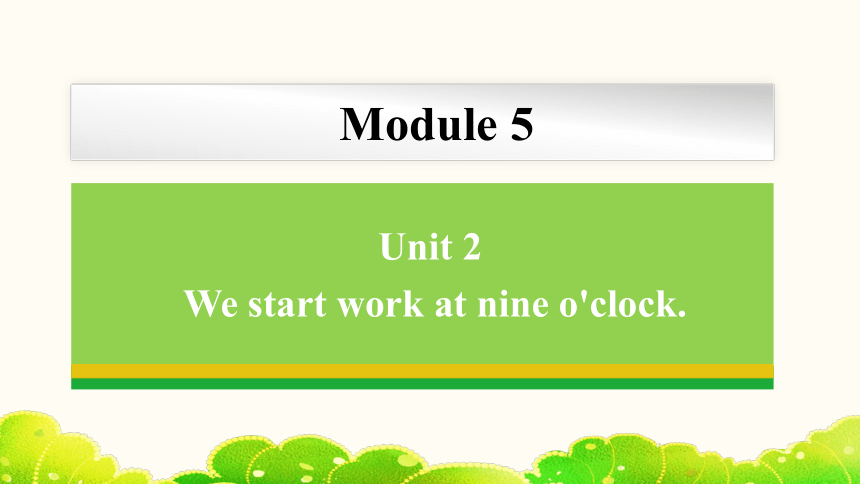
|
|
| 格式 | pptx | ||
| 文件大小 | 4.3MB | ||
| 资源类型 | 教案 | ||
| 版本资源 | 外研版 | ||
| 科目 | 英语 | ||
| 更新时间 | 2024-01-18 00:00:00 | ||
图片预览

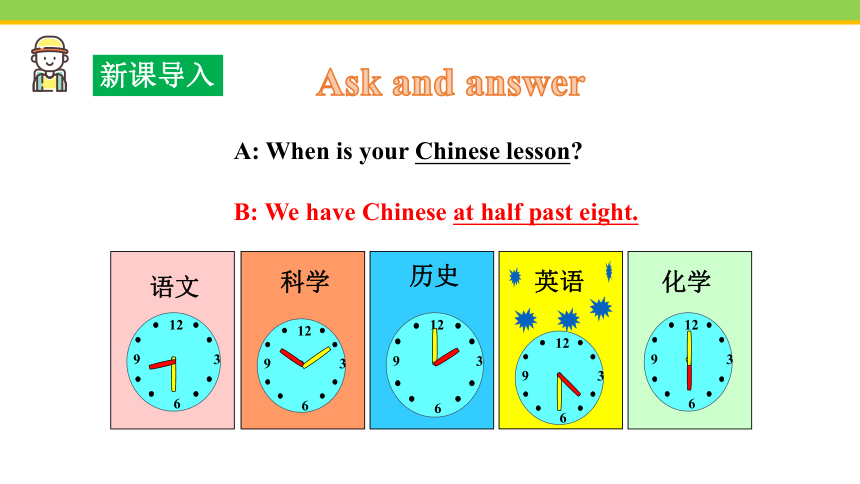
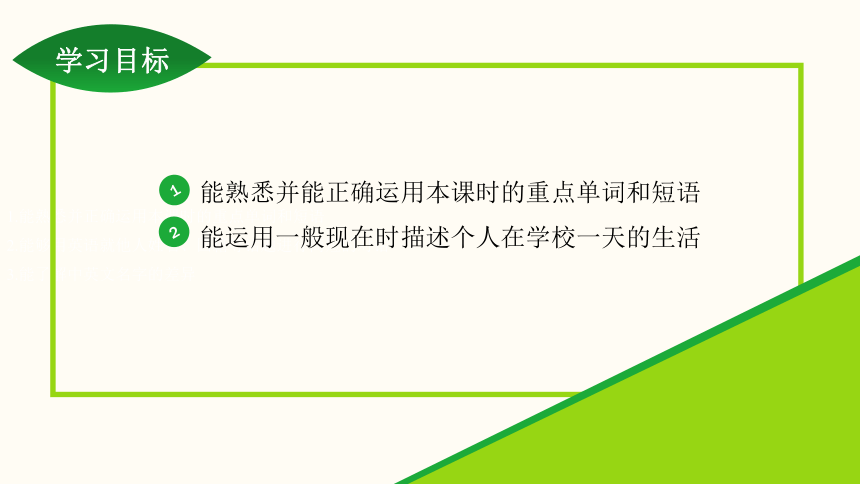
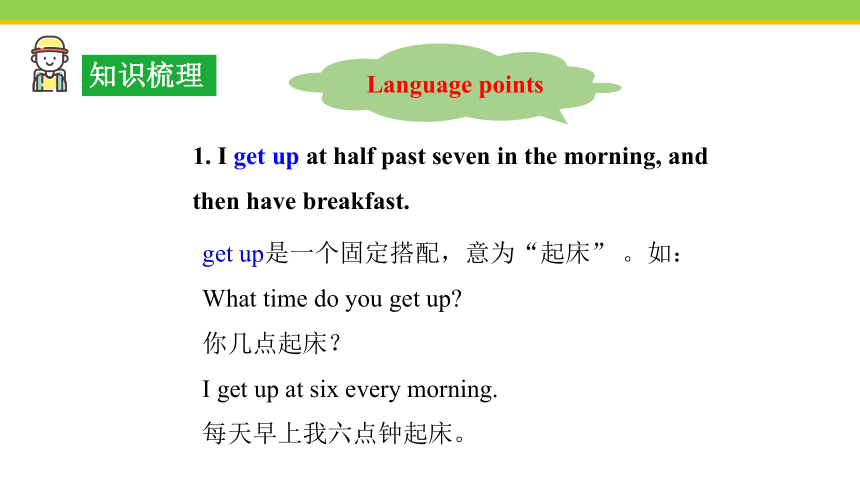
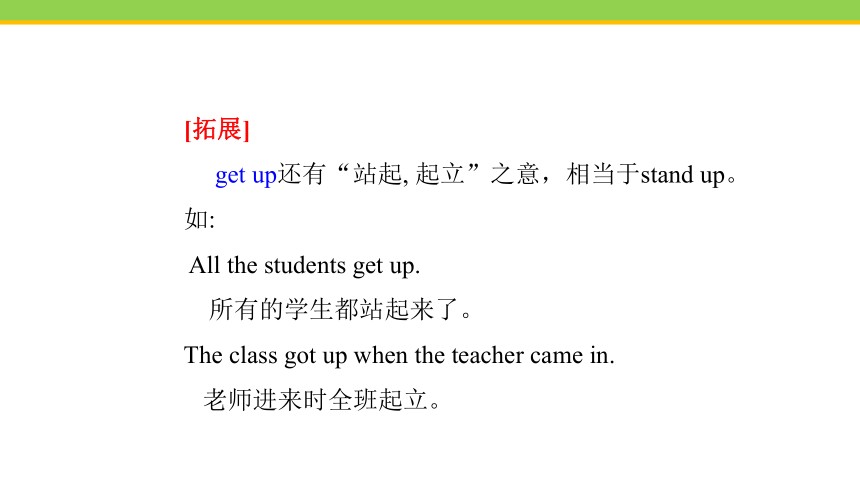
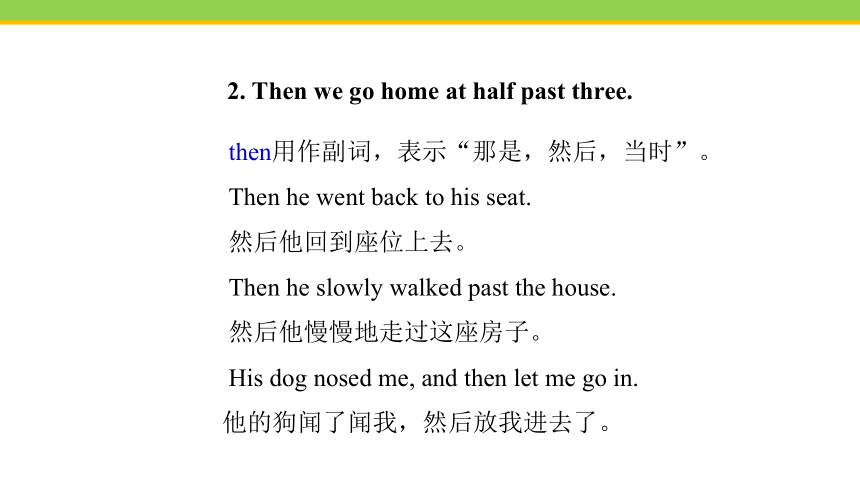
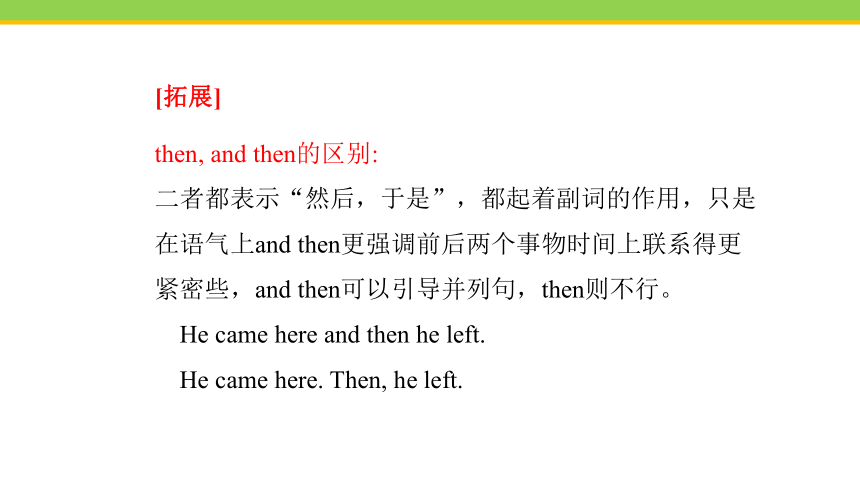
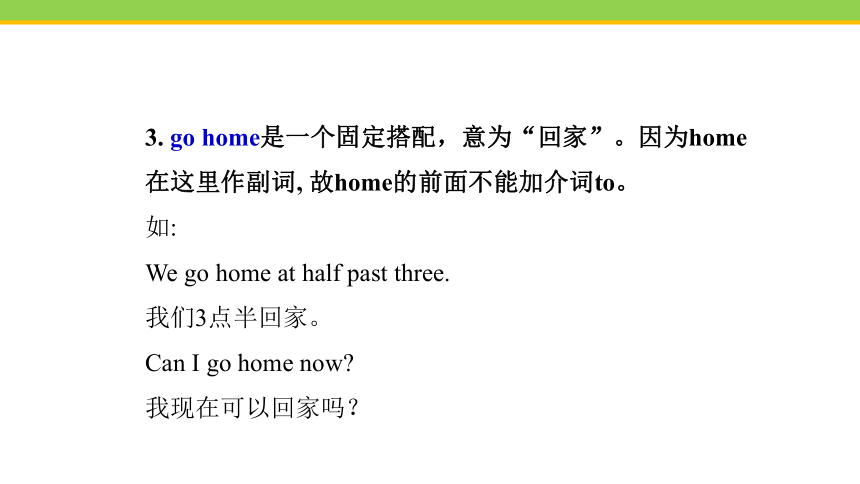
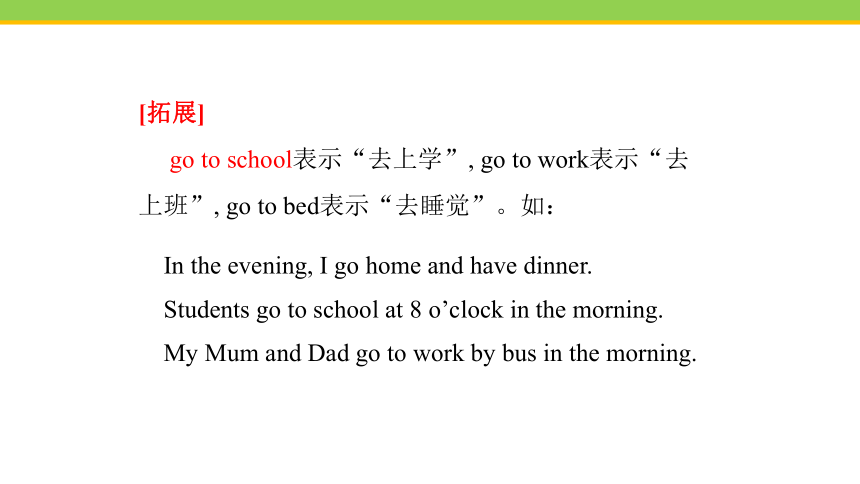
文档简介
(共23张PPT)
Module 5
Unit 2
We start work at nine o'clock.
新课导入
A: When is your Chinese lesson
B: We have Chinese at half past eight.
Ask and answer
语文
12
6
9
3
英语
12
6
9
3
化学
12
6
9
3
科学
12
6
9
3
历史
12
6
9
3
能熟悉并能正确运用本课时的重点单词和短语
能运用一般现在时描述个人在学校一天的生活
2
1
知识梳理
Language points
1. I get up at half past seven in the morning, and then have breakfast.
get up是一个固定搭配,意为“起床” 。如:
What time do you get up
你几点起床?
I get up at six every morning.
每天早上我六点钟起床。
[拓展]
get up还有“站起, 起立”之意,相当于stand up。如:
All the students get up.
所有的学生都站起来了。
The class got up when the teacher came in.
老师进来时全班起立。
2. Then we go home at half past three.
then用作副词,表示“那是,然后,当时”。
Then he went back to his seat.
然后他回到座位上去。
Then he slowly walked past the house.
然后他慢慢地走过这座房子。
His dog nosed me, and then let me go in.
他的狗闻了闻我,然后放我进去了。
[拓展]
then, and then的区别:
二者都表示“然后,于是”,都起着副词的作用,只是在语气上and then更强调前后两个事物时间上联系得更紧密些,and then可以引导并列句,then则不行。
He came here and then he left.
He came here. Then, he left.
3. go home是一个固定搭配,意为“回家”。因为home在这里作副词, 故home的前面不能加介词to。
如:
We go home at half past three.
我们3点半回家。
Can I go home now
我现在可以回家吗?
[拓展]
go to school表示“去上学”, go to work表示“去上班”, go to bed表示“去睡觉”。如:
In the evening, I go home and have dinner.
Students go to school at 8 o’clock in the morning.
My Mum and Dad go to work by bus in the morning.
get up
go to school
have breakfast
have lunch
运用一般现在时描述个人在学校一天的生活情况
1 Look and learn
go to bed
go home
have dinner
do homework
play football
Activity 1-Read the passage and put the pictures in order.
While-reading:
a
b
c
d
e
f
1
2
3
5
6
4
b
2 Match the times with the pictures in Activity 1.
f
a
d
c
e
a. 7:30 am b. 10:00 pm c. 11:00 am
d. 12:30 pm e. 3:30 pm f. 9:00 am
1 I get up / start work at half past seven.
2 We have a break / have lunch at half past twelve.
3 I go home / watch TV in the evening.
4 I do my homework / see my friends in the evening.
5 I go home / go to sleep at ten o’clock.
3 Underline the correct expressions.
When What to do
in the morning 7:30 get up
8:00
lessons start
11:00
12:30
1:30
go home
10:00 go to bed
in the afternoon
in the evening
4 Talk about your school day.
示例:
I get up at half past seven.
I start work at nine o’clock.
I have lunch at half past twelve.
Pair work
活动小结
通过以上活动,我们发现,常见一天生活的短语:上学1._____________,起床2.__________,吃早餐3.____________,踢足球4.___________,看电视5.___________,去睡觉6.___________等等。
go to school
get up
have breakfast
play football
watch TV
go to bed
I get up at seven o’clock. I go to school at eight o’clock.
I get up at seven o’clock, and then go to school at eight o’clock.
6 Look at the sentences
能用and then连接两个简单句
Now join the sentences with and then.
1. In the morning, we get up. We go to school.
2. In the afternoon, we have lessons. We play football in the playground.
3. In the evening, I have dinner. I do my homework.
4. In the evening, I do my homework. I go to bed.
In the morning, we get up, and then go to school.
In the afternoon, we have lessons, and then we play football in the playground.
In the evening, I have dinner, and then do my homework.
In the evening, I do my homework, and then go to bed.
示例:
He came here. He left.
He came here ,and then he left.
Pair work
活动小结
通过以上活动,我们发现:__________ 用来连接先后发生的两个动作。
and、then
当堂检测
1. She ____ (go) to bed at nine o’clock.
2. You ________ (not go) home.
3. She _______ (watch) TV in the evening.
4. He gets up and ___ (have) breakfast.
5. _______ (lesson) start at half past one in the afternoon.
6. We do our __________ (homework) in the evening.
goes
don’t go
watches
has
Lessons
homework
一、用所给的单词的适当形式填空
常见一天生活的短语:
上学go to school,起床get up,吃早餐have breakfast,踢足球play football,看电视watch TV,去睡觉go to bed等等
重点单词和短语:
go to school,weekday,get up,have ,breakfast,house,start,work,break,have ,lunch,go ,home,evening,watch etc.
Module 5
Unit 2
Module 5
Unit 2
We start work at nine o'clock.
新课导入
A: When is your Chinese lesson
B: We have Chinese at half past eight.
Ask and answer
语文
12
6
9
3
英语
12
6
9
3
化学
12
6
9
3
科学
12
6
9
3
历史
12
6
9
3
能熟悉并能正确运用本课时的重点单词和短语
能运用一般现在时描述个人在学校一天的生活
2
1
知识梳理
Language points
1. I get up at half past seven in the morning, and then have breakfast.
get up是一个固定搭配,意为“起床” 。如:
What time do you get up
你几点起床?
I get up at six every morning.
每天早上我六点钟起床。
[拓展]
get up还有“站起, 起立”之意,相当于stand up。如:
All the students get up.
所有的学生都站起来了。
The class got up when the teacher came in.
老师进来时全班起立。
2. Then we go home at half past three.
then用作副词,表示“那是,然后,当时”。
Then he went back to his seat.
然后他回到座位上去。
Then he slowly walked past the house.
然后他慢慢地走过这座房子。
His dog nosed me, and then let me go in.
他的狗闻了闻我,然后放我进去了。
[拓展]
then, and then的区别:
二者都表示“然后,于是”,都起着副词的作用,只是在语气上and then更强调前后两个事物时间上联系得更紧密些,and then可以引导并列句,then则不行。
He came here and then he left.
He came here. Then, he left.
3. go home是一个固定搭配,意为“回家”。因为home在这里作副词, 故home的前面不能加介词to。
如:
We go home at half past three.
我们3点半回家。
Can I go home now
我现在可以回家吗?
[拓展]
go to school表示“去上学”, go to work表示“去上班”, go to bed表示“去睡觉”。如:
In the evening, I go home and have dinner.
Students go to school at 8 o’clock in the morning.
My Mum and Dad go to work by bus in the morning.
get up
go to school
have breakfast
have lunch
运用一般现在时描述个人在学校一天的生活情况
1 Look and learn
go to bed
go home
have dinner
do homework
play football
Activity 1-Read the passage and put the pictures in order.
While-reading:
a
b
c
d
e
f
1
2
3
5
6
4
b
2 Match the times with the pictures in Activity 1.
f
a
d
c
e
a. 7:30 am b. 10:00 pm c. 11:00 am
d. 12:30 pm e. 3:30 pm f. 9:00 am
1 I get up / start work at half past seven.
2 We have a break / have lunch at half past twelve.
3 I go home / watch TV in the evening.
4 I do my homework / see my friends in the evening.
5 I go home / go to sleep at ten o’clock.
3 Underline the correct expressions.
When What to do
in the morning 7:30 get up
8:00
lessons start
11:00
12:30
1:30
go home
10:00 go to bed
in the afternoon
in the evening
4 Talk about your school day.
示例:
I get up at half past seven.
I start work at nine o’clock.
I have lunch at half past twelve.
Pair work
活动小结
通过以上活动,我们发现,常见一天生活的短语:上学1._____________,起床2.__________,吃早餐3.____________,踢足球4.___________,看电视5.___________,去睡觉6.___________等等。
go to school
get up
have breakfast
play football
watch TV
go to bed
I get up at seven o’clock. I go to school at eight o’clock.
I get up at seven o’clock, and then go to school at eight o’clock.
6 Look at the sentences
能用and then连接两个简单句
Now join the sentences with and then.
1. In the morning, we get up. We go to school.
2. In the afternoon, we have lessons. We play football in the playground.
3. In the evening, I have dinner. I do my homework.
4. In the evening, I do my homework. I go to bed.
In the morning, we get up, and then go to school.
In the afternoon, we have lessons, and then we play football in the playground.
In the evening, I have dinner, and then do my homework.
In the evening, I do my homework, and then go to bed.
示例:
He came here. He left.
He came here ,and then he left.
Pair work
活动小结
通过以上活动,我们发现:__________ 用来连接先后发生的两个动作。
and、then
当堂检测
1. She ____ (go) to bed at nine o’clock.
2. You ________ (not go) home.
3. She _______ (watch) TV in the evening.
4. He gets up and ___ (have) breakfast.
5. _______ (lesson) start at half past one in the afternoon.
6. We do our __________ (homework) in the evening.
goes
don’t go
watches
has
Lessons
homework
一、用所给的单词的适当形式填空
常见一天生活的短语:
上学go to school,起床get up,吃早餐have breakfast,踢足球play football,看电视watch TV,去睡觉go to bed等等
重点单词和短语:
go to school,weekday,get up,have ,breakfast,house,start,work,break,have ,lunch,go ,home,evening,watch etc.
Module 5
Unit 2
同课章节目录
- Starte
- Module 1 My teacher and my friends
- Module 2 My English lesson
- Module 3 My English book
- Module 4 My everyday life
- Module 1 My classmates
- Unit 1 Nice to meet you.
- Unit 2 I'm Wang Lingling and I'm thirteen years ol
- Unit 3 Language in use.
- Module 2 My family
- Unit 1 Is this your mum?
- Unit 2 These are my parents.
- Unit 3 Language in use.
- Module 3 My school
- Unit 1 There are thirty students in my class.
- Unit 2 The library is on the left of the playgroun
- Unit 3 Language in use.
- Module 4 Healthy food
- Unit 1 We've got lots of apples.
- Unit 2 Is your food and drink healthy?
- Unit 3 Language in use.
- Module 5 My school day
- Unit 1 I love history.
- Unit 2 We start work at nine o'clock.
- Unit 3 Language in use.
- Revision module A
- Module 6 A trip to the zoo
- Unit 1 Does it eat meat?
- Unit 2 The tiger lives in Asia.
- Unit 3 Language in use.
- Module 7 Computers
- Unit 1 How do I write my homework on the computer?
- Unit 2 When do you use a computer?
- Unit 3 Language in use.
- Module 8 Choosing presents
- Unit 1 I always like birthday parties.
- Unit 2 She often goes to concerts.
- Unit 3 Language in use.
- Module 9 People and places
- Unit 1 We're enjoying the school trip a lot.
- Unit 2 They're waiting for buses or trains.
- Unit 3 Language in use.
- Module 10 Spring Festival
- Unit 1 Are you getting ready for Spring Festival?
- Unit 2 My mother's cleaning our houses and sweepin
- Unit 3 Language in use.
- Revision module B
